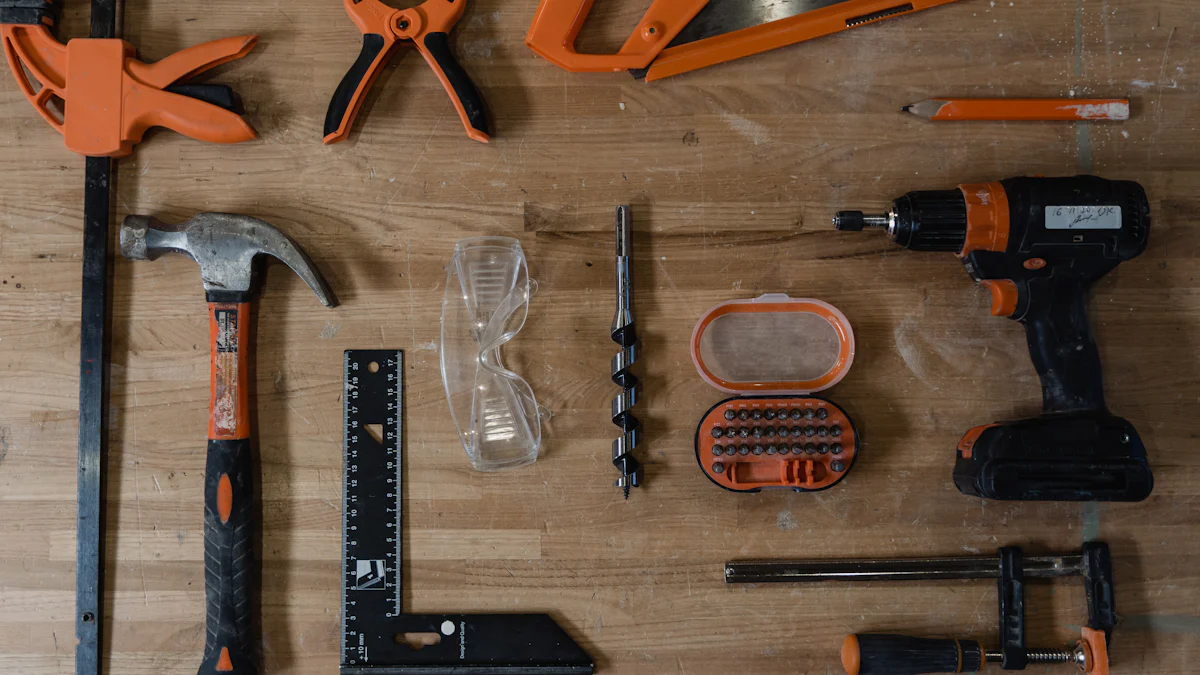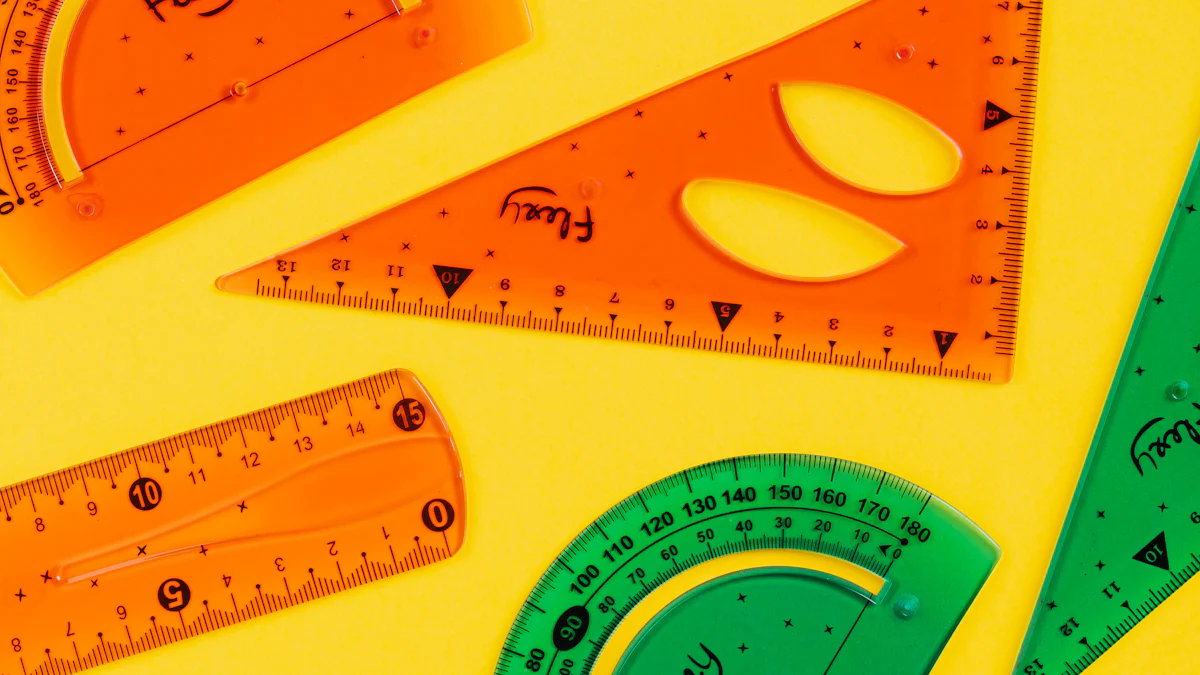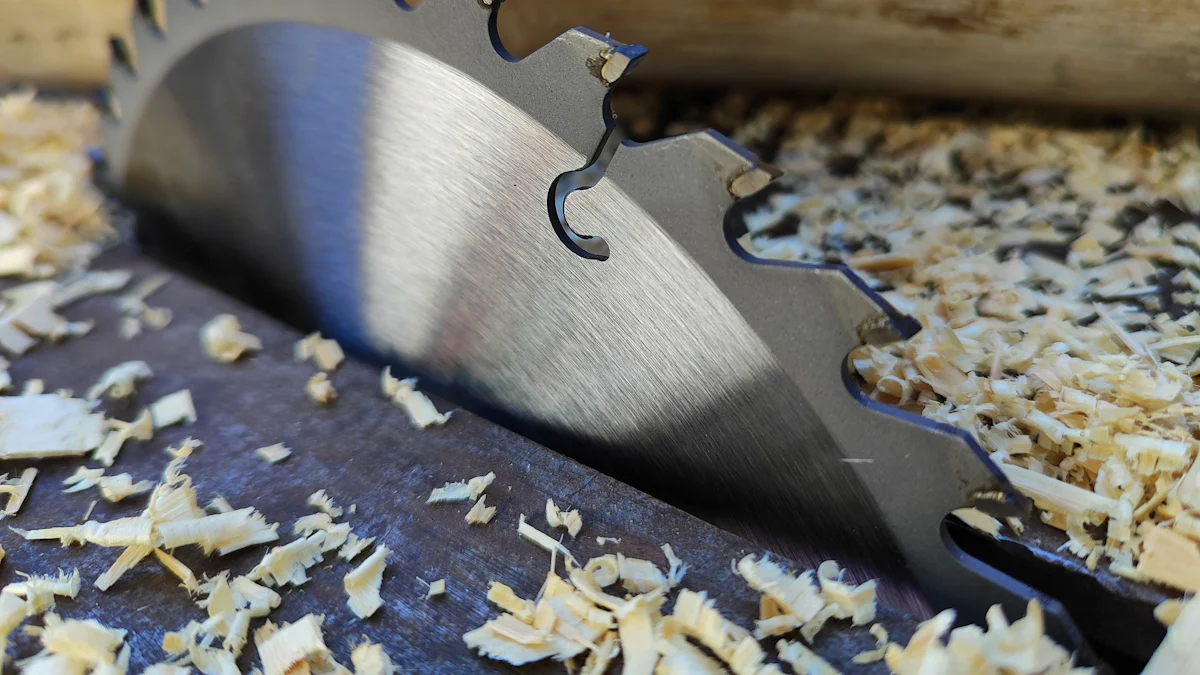
Having the right tools in a workshop is crucial for efficiency and safety. Proper tools significantly improve productivity and reduce physical strain on workers. The top 10 essential workshop hand tools include items like tape measures, handsaws, and screwdrivers. These tools offer universal applicability, enhancing the quality of work across various tasks. Investing in quality tools ensures cost-effectiveness by minimizing mistakes and time wastage.
Workshop Hand Tools for Measuring and Marking

Tape Measure
Features to Look For
A tape measure is indispensable among workshop hand tools. Look for a tape measure with a durable, retractable blade. Ensure the blade has clear, easy-to-read markings. A good tape measure should extend up to 6 feet without bending. Consider a model with a locking mechanism to hold measurements in place. Magnetic tips can provide additional stability when measuring metal surfaces.
Benefits of Accurate Measurements
Accurate measurements are crucial in any workshop. Precise measurements ensure that materials fit together correctly. This reduces waste and saves time. Proper measurements also enhance the safety of projects by preventing errors that could lead to structural failures. Consistent accuracy improves the overall quality of work.
Combination Square
Versatility in Use
The combination square stands out for its versatility. This tool measures both 90 and 45 degrees. The adjustable sliding ruler features laser-etched measurement graduations. Use the combination square as a depth gauge, marking gauge, miter square, and try square. The head can function as a small level. A scribe inserted at the bottom serves as a handy marking tool.
Key Features
Key features of the combination square include its multi-functionality. The sliding ruler locks to the head for various uses. The tool offers precision in measuring and marking. The built-in scribe provides convenience. The combination square’s ability to true up workpieces and lay out joints makes it invaluable among workshop hand tools.
Marking Gauge
Precision in Marking
A marking gauge ensures precision in marking lines on materials. This tool is essential for woodworking and metalworking. The marking gauge helps achieve consistent depth and alignment. It reduces the risk of errors in cutting and assembling pieces. Precision marking enhances the overall quality of finished projects.
Types of Marking Gauges
Several types of marking gauges exist. The traditional marking gauge features a wooden or metal body with a sharp pin or knife. The wheel marking gauge includes a circular blade for smoother lines. Mortise gauges have dual pins for marking parallel lines. Each type offers unique benefits, making them versatile workshop hand tools.
Workshop Hand Tools for Cutting

Handsaw
Types of Handsaws
A handsaw serves as a fundamental tool in any workshop. Various types of handsaws exist, each designed for specific tasks. The crosscut saw cuts across the wood grain, providing clean and precise cuts. The rip saw cuts parallel to the wood grain, making it ideal for ripping boards. The backsaw features a reinforced spine, ensuring straight cuts for fine woodworking. The coping saw excels at cutting intricate shapes and curves. Each type of handsaw offers unique advantages, making them indispensable workshop hand tools.
Choosing the Right Handsaw
Selecting the appropriate handsaw depends on the task at hand. For general woodworking, a crosscut saw or rip saw suffices. Fine woodworking projects benefit from the precision of a backsaw. Intricate work requires the flexibility of a coping saw. Consider the teeth per inch (TPI) when choosing a handsaw. Higher TPI provides smoother cuts, while lower TPI allows faster cutting. A comfortable handle enhances control and reduces fatigue. Investing in quality handsaws ensures durability and efficiency in the workshop.
Utility Knife
Safety Features
A utility knife proves essential for various cutting tasks in the workshop. Safety features play a crucial role in its design. A retractable blade minimizes the risk of accidental cuts. A locking mechanism secures the blade during use, preventing slippage. Rubberized handles offer a firm grip, reducing the chance of mishaps. Some models include a snap-off blade feature, allowing for a fresh, sharp edge. Prioritizing safety features ensures a safer working environment.
Versatility in Cutting
The utility knife stands out for its versatility among workshop hand tools. Capable of cutting materials like cardboard, plastic, and tape, it handles a wide range of tasks. The OLFA LA-X model exemplifies this versatility with its long, snap-off blade. The rubber inlay handle provides excellent cutting control. A utility knife proves invaluable for both precision and heavy-duty cutting. Its compact size and ease of use make it a staple in any workshop.
Workshop Hand Tools for Fastening
Claw Hammer
Types of Claw Hammers
A claw hammer is a staple among workshop hand tools. Various types of claw hammers exist, each suited for specific tasks. The curved claw hammer excels at pulling nails and performing light demolition work. The straight claw hammer, also known as a rip hammer, handles heavy-duty prying and splitting tasks. The framing hammer features a longer handle and heavier head, ideal for driving large nails into tough materials. Each type offers unique benefits, making them essential in any workshop.
Proper Use and Safety
Proper use of a claw hammer ensures efficiency and safety. Always grip the handle near the end for maximum leverage. Swing the hammer with controlled force to avoid missing the target. When pulling nails, position the claw under the nail head and apply steady pressure. Wear safety glasses to protect your eyes from flying debris. Regularly inspect the hammer for signs of wear, such as a loose head or damaged handle. Investing in a quality hammer, like the Estwing model, guarantees durability and reliability. A well-maintained hammer enhances both performance and safety in the workshop.
Screwdrivers
Different Types of Screwdrivers
Screwdrivers are indispensable workshop hand tools, available in various types. The flathead screwdriver features a flat, straight blade, suitable for slotted screws. The Phillips screwdriver has a cross-shaped tip, designed for Phillips screws. The Torx screwdriver includes a star-shaped tip, providing extra grip for Torx screws. Precision screwdrivers, with their small tips, handle delicate tasks like electronics repair. Each type serves a specific purpose, ensuring versatility in the workshop.
Importance of Quality
Quality screwdrivers enhance both performance and safety. A well-made screwdriver fits snugly into the screw head, reducing the risk of slippage. High-quality materials, such as chrome-vanadium steel, ensure durability and resistance to wear. Ergonomic handles provide a comfortable grip, minimizing hand fatigue during extended use. Investing in a reputable brand guarantees long-lasting tools that perform reliably. Quality screwdrivers contribute to efficient and precise work, making them invaluable in any workshop.
Workshop Hand Tools for Gripping
Pliers
Types of Pliers
Pliers serve as essential workshop hand tools, offering various types for different tasks. Needle-nose pliers feature long, slender jaws, ideal for reaching into tight spaces. Slip-joint pliers have adjustable jaws, allowing for gripping objects of varying sizes. Diagonal pliers, also known as wire cutters, excel at cutting wires and small pins. Locking pliers, or Vise-Grips, provide a strong grip on objects, making them useful for holding materials in place. Each type of plier offers unique benefits, enhancing the versatility of a workshop.
Common Uses
Pliers perform numerous functions in a workshop. Needle-nose pliers assist in bending and shaping wires. Slip-joint pliers handle general gripping tasks, such as turning bolts or holding objects steady. Diagonal pliers cut through wires and small metal pieces with precision. Locking pliers clamp onto objects securely, freeing up hands for other tasks. These common uses make pliers indispensable among workshop hand tools.
Adjustable Wrench
Versatility in Gripping
An adjustable wrench stands out for its versatility among workshop hand tools. The adjustable jaw allows for gripping nuts and bolts of various sizes. This tool eliminates the need for multiple wrenches, saving space in the toolbox. Mechanics, plumbers, electricians, and carpenters all benefit from the adjustable wrench’s adaptability. The ability to adjust the jaw width makes this tool suitable for a wide range of applications.
Choosing the Right Size
Selecting the appropriate size for an adjustable wrench ensures efficiency and safety. Smaller wrenches, such as 6-inch models, work well for light-duty tasks. Larger wrenches, like 12-inch models, handle heavy-duty applications. Consider the jaw capacity when choosing a wrench. A larger jaw capacity accommodates bigger nuts and bolts. Ergonomic handles provide comfort during extended use. Investing in a high-quality adjustable wrench guarantees durability and reliable performance in the workshop.
Workshop Hand Tools for Finishing
Chisels
Types of Chisels
Chisels serve as essential workshop hand tools for shaping and carving materials. Various types of chisels exist, each designed for specific tasks. Bench chisels handle general woodworking tasks. Mortise chisels excel at cutting deep, square holes. Paring chisels feature long, thin blades for delicate work. Firmer chisels have thicker blades for heavy-duty tasks. Each type of chisel provides unique benefits, making them indispensable in any workshop.
Proper Maintenance
Proper maintenance ensures the longevity and performance of chisels. Regularly sharpen the blades using a sharpening stone or honing guide. Clean the chisels after each use to remove debris and prevent rust. Store chisels in a protective case to avoid damage. Inspect the handles for cracks or splits and replace them if necessary. Investing time in maintenance enhances the efficiency and safety of these workshop hand tools.
Files and Rasps
Different Types
Files and rasps play a crucial role among workshop hand tools for finishing tasks. Flat files smooth and shape flat surfaces. Round files work well for enlarging holes and smoothing curved surfaces. Half-round files offer versatility with both flat and curved surfaces. Rasps feature coarse teeth for rapid material removal. Each type of file and rasp serves a specific purpose, contributing to the precision of finishing work.
Applications in Finishing
Files and rasps provide various applications in finishing tasks. Use flat files to achieve smooth, even surfaces on wood or metal. Round files help refine the edges of drilled holes. Half-round files offer flexibility in shaping both flat and curved areas. Rasps quickly remove excess material, preparing surfaces for finer finishing. These workshop hand tools enhance the quality and precision of finished projects.
Each tool in a workshop plays a crucial role in enhancing efficiency and safety. Quality tools significantly improve productivity and reduce physical strain on workers. Investing in high-quality tools ensures longevity and reliability, minimizing mistakes and time wastage. A well-equipped workshop not only boosts the quality of work but also fosters a safer working environment. Building a comprehensive toolkit with these essential hand tools sets the foundation for successful and efficient projects.
See Also
Scooter Upgrades: High-Quality Parts for Maximum Performance
Winter Comfort: Stay Cozy with Plush Socks and Towels
Dive into Diverse Sock Options for Both Genders
